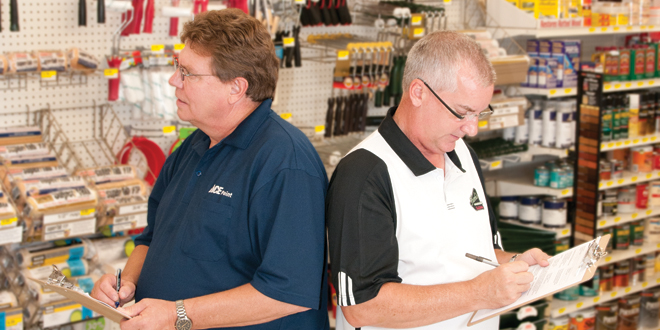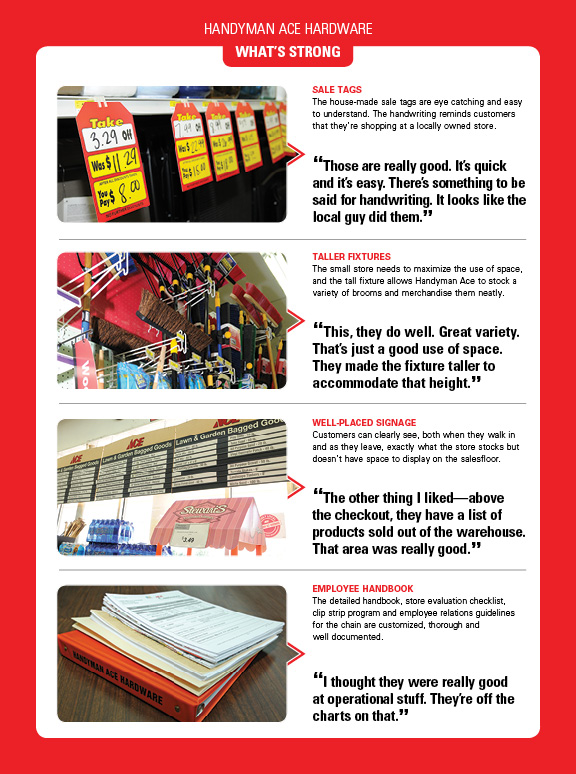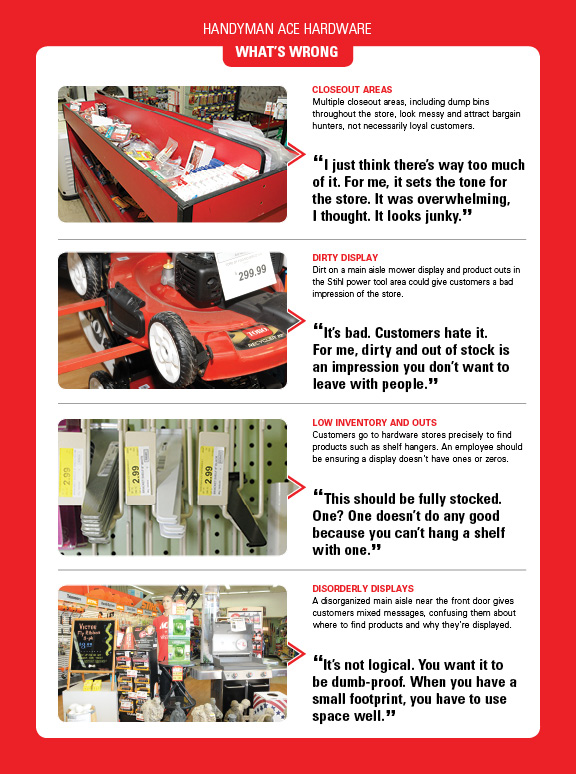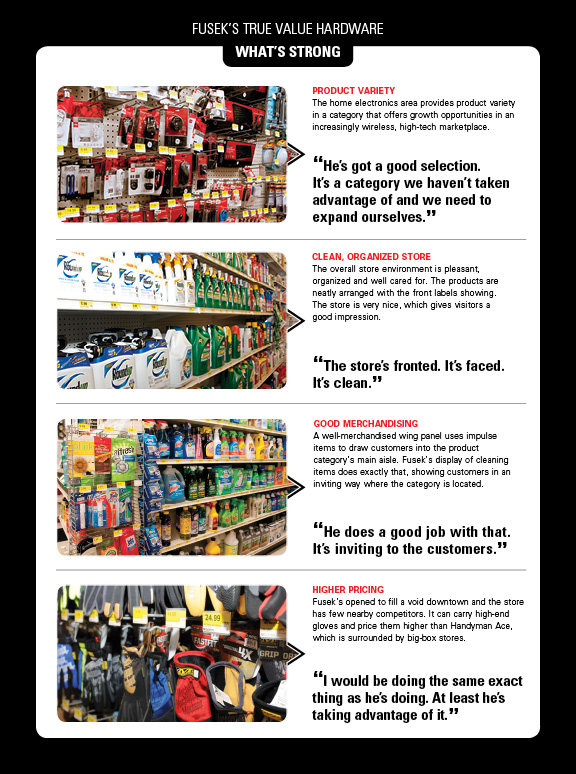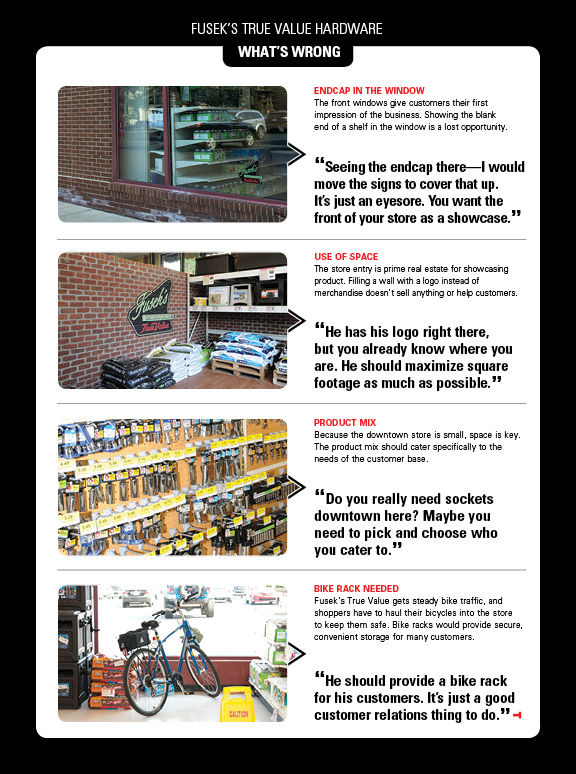To view a PDF of this story, click here. Visit hardwareretailing.com/peer-critique for a critique sheet and hardwareretailing.com/store-tours for a tour of the two different stores.
The partnerships started as a pact between three California retailers who knew each other through their co-op.
The store owners wanted honest, thorough critiques of their home improvement stores. All three had reputations as good retailers, and they respected each other. They also wanted some solid ideas for ways to improve their businesses.
“I’ll be brutally honest with you if you’ll be brutally honest with me,” is what they promised, according to Paul Filice, co-owner of Miner’s Ace Hardware, a seven-store chain headquartered in Grover Beach, California. He, Eric Hassett of Hassett Hardware and Mark Schulein of Crown Ace Hardware agreed to start visiting each other’s stores and offering business advice.
That was in 2011, and after touring the stores, the West Coast retailers realized the feedback they gave and received was helpful for every aspect of business—from merchandising grass seed to hiring store managers and poring over financials.
“We have always had good results,” Filice says. “We’ve probably seen a six-figure improvement on sales or profitability or both. Some of the minor changes can be hugely impactful on an ongoing basis.”
While all retailers might not see these kinds of results, business owners should be constantly evaluating their operations and looking for ways to improve. Fresh perspectives from peers can make a massive difference. That’s why Hardware Retailing asked two retailers who serve noncompeting markets to visit and critique each other’s stores. We’ll describe their process in this story to illustrate how anyone can use peer reviews to get a brutally honest assessment of their business.
Hard Words
Filice’s group now includes six Ace retailers from across the country. They are all too busy for a trip to turn into merely an average meeting, so they work hard to make the most of every one, Mark Schulein says.
“The conversations never stray too far from hardware retailing, but anything is open to dialogue. We talk about current challenges and future concerns, and anything that keeps us up at night,” he says.
“We have really meaningful and valuable conversations. It doesn’t have to be about specifics of the business, and can be about anything that impacts our ability to be best-in-class retailers, managers and owners. It’s an open forum that provides a great sounding board for business success.”
They have developed a technique and strategies to help each other that you and other retailers can imitate, as long as you’re willing to take direct criticism. Those six Ace retailers, who jokingly call themselves the Pterodactyl Management Group, have learned to accept hard words and profited from each other’s brutal honesty.
“We try to do it respectfully. The intent is to be very respectful and positive, but sharing the truth,” Schulein says.
Their approach is based loosely on the idea of seagull management, which involves visitors coming into a business, analyzing the operations and leaving behind a laundry list of criticism for the owners to handle. Visit www.hardwareretailing.com/pterodactyl for the backstory on the group’s name.
The constructive criticism is sometimes hard to swallow, but the retailers know they’re hearing valuable opinions from smart operators who are only there to help, Schulein says.
“We take it really seriously, but we also have a good time,” he says. “I value their opinion. I value their criticism. And it’s not without its bumps and grinds.”
The Pterodactyls’ model for offering peer feedback inspired the project that is described later in this story, which Hardware Retailing tested with two retailers in the Midwest. The goal is to provide you with resources and ideas for connecting with and learning from other business owners.
What To Do
To make a peer critique group work requires finding other store owners who are committed to sharing financial information, touring stores and offering both encouragement and critical feedback. Finding retailers interested in partnering may not be as hard as it sounds. In the short time spent developing this story, Hardware Retailing came across nearly a dozen good retailers who think annual store critiques would highly benefit their businesses.
Making critiques work, though, requires trusting the other retailers, committing time and agreeing to accept and give brutally honest criticism, Filice says.
The Pterodactyl Management Group began as an idea from friends, but a committed team doesn’t have to start as organically.
For example, Jim Lehrer, owner of Brownsboro Hardware & Paint in Louisville, Kentucky, joined a group facilitated by Do it Best Corp. of Fort Wayne, Indiana. The 16 members own businesses across the U.S. from Seattle to Orlando, Florida, and they are like-minded and committed to helping each other improve in business.
“It’s a great group and I’m honored and glad I’m part of it. At the end of the day, it’s made me a much better retailer,” Lehrer says.
The commitment for both the Do it Best and Ace groups includes annual store visits hosted by a team member or two, coordinating many busy schedules and paying for travel.
Prior to the visits, Pterodactyl members share basic information such as how old the stores are, revenue numbers, key performance indicators, pertinent competitor data and explanations of recent remodels or other business changes.
The Do it Best group shares financial information throughout the year, regardless of which stores are getting the visits, to help each other benchmark their businesses. The members do employee compensation comparisons and product price comparisons, study department sales and look for margin opportunities. “You’re going to get what you put into it,” Lehrer says.
During the visits, the retailers walk through store aisles, poke around in back rooms and crunch numbers. Afterward, the group members recommend actionable steps for improving the businesses, but they also pick up good ideas to take home, Lehrer says.
“To make more money in this business, you’ve got to increase sales, reduce expenses and improve your margins. As a group, we try to focus on all three of those things,” he says.
“There’s not one silver bullet that I’ve gained out of this thing, but there are a lot of little things I’ve gained along the way.”
The North American Hardware Retail Association (NRHA) can help facilitate similar collaborations through roundtable discussions or connecting association members who are interested in peer feedback.
Scott Wright, executive director of NRHA’s Retail Leadership Institute, can also help. Wright can be reached by phone at 317-275-9417 or email at swright@nrha.org.
The experience of the two retailers who Hardware Retailing asked to visit and critique each other’s stores can offer some guidance for getting feedback on your own business.
The retailers we paired up for this project are Steve Fusek, owner of Fusek’s True Value Hardware in downtown Indianapolis, and David Grimes, owner of nine Handyman Ace Hardware stores in the Dayton, Ohio, area.
Fusek and Grimes had not met prior to the first store visit, and—unlike the members of the two peer critique groups featured previously in this story—did not exchange financials.
In late July, Fusek visited Grimes’ Fairborn, Ohio, store, which is 14,500 square feet and 25 years old. The store’s customer base is about 75 percent DIY and 25 percent commercial.
Grimes then toured Fusek’s store, which is 11 years old and 10,000 square feet. Its customer base is 70 percent urban DIYers and 30 percent pro.
For the critiques, Grimes and Fusek walked every store aisle and also checked out back rooms and storage areas. They swapped ideas and later exchanged written feedback.
The retailers graded each other’s businesses on areas such as store appearance, cleanliness, organization, merchandising and inventory levels. Both retailers also offered each other suggestions for how to improve the stores.
 The Takeaways
The Takeaways
Much of what Fusek and Grimes noticed during the store tours included how very different their businesses are.
For example, Grimes oversees a multistore operation and hadn’t been to his store for about two months prior to Fusek’s visit. He delegates most day-to-day in-store duties to his staff.
Fusek, on the other hand, has an office inside his single location, and he walks the floor multiple times a day observing his employees, noting product outs and straightening displays.
“His philosophies and my philosophies are a little bit different because I’m not there as much,” Grimes says.
They chose to disagree on some issues. For instance, Grimes likes closeout sections.Fusek doesn’t, so he donates dead product to a nonprofit organization to get rid of it.
But the outside perspective will inspire changes at Handyman Ace Hardware, and Grimes will discuss Fusek’s feedback with his Fairborn manager, he says. They will reorganize the entrance of the store and implement other suggestions if they agree with them, he says.
“I plan on taking this as an action plan and doing something about it,” Grimes says.
Some of Grimes’ recommendations to Fusek weren’t new ideas, but they made Fusek realize he needs to take action. When Grimes called Fusek’s tool department lackluster, Fusek had to agree. He will look for ways to spice up the category at his next co-op buying show, he says.
Grimes’ fresh look at his merchandising offered new insight, Fusek says. Based on Grimes’ suggestion, he plans to move an 8-foot display of trashcans onto a top shelf where he keeps overstock, and consider moving other large items to top shelves also.
“That’s going to create a lot of space in our store that we never had before,” Fusek says. “We all see things a little bit differently, and really, you’re not trying to call the guy out. You’re looking for recommendations to make his store better.”
The following pages provide more of Fusek’s and Grimes’ feedback on each other’s businesses.
 Hardware Retailing The Industry's Source for Insights and Information
Hardware Retailing The Industry's Source for Insights and Information



